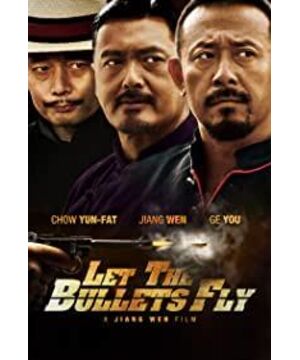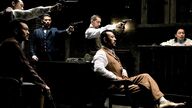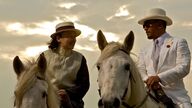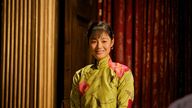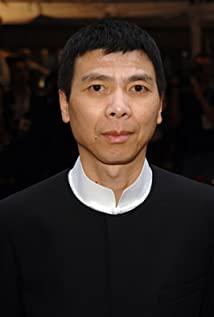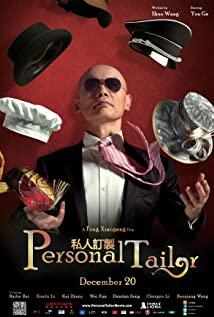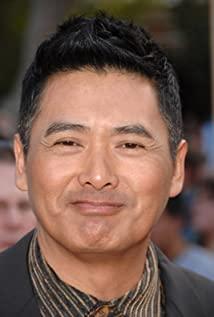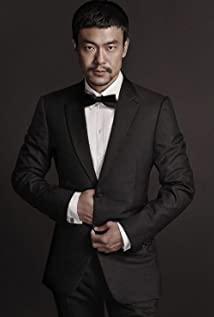After watching "Let the Bullets Fly" come back at night, I can't sleep at night, my blood is swollen and meaningful.
"Outside the pavilion, along the ancient road, the grass is green..." The eagle soared in the sky, overlooking the continuous mountains, and then the march of "The Sun Also Rises" sounded, the train roared, the horses neighed, the gunshots were deafening, and The lyricism just now formed a sharp contrast, what is called hi, this motherfucker is called hi. Throughout the show, the audience laughed and laughed, and there were whimsical ideas everywhere. It was still Jiang Wen's usual aggressive style. The editing was fierce, the dialogue was interesting and dense, and the brain couldn't keep up with the fast rhythm, and the details were missed.
I have been infatuated with Jiang Wen since my junior high school days. I remember that I was also 17 years old. "Sunny Days" and "The Devils Are Coming" gave me a shock that could not be cured. After watching "The Devils" nearly 20 times, the whole I can memorize the lines of the film, is this necessary? Just like when the three partners imitated the plot of Godard's "Outlaws" in "Dream of Paris" and flew in the Louvre, there was a moment when the boundaries between life and film were blurred, as if from a different world. Dreaming like crazy...
As Soderbergh said, "The Devil Comes" has made Chinese films before and after it bleak. Since Zhang Yimou started the era of Chinese commercial films, although the quality of China has gradually improved, the audience still sees one film and criticizes the other. The right to speak of commercial films is in the hands of the three-legged Zhang, Chen, and Feng, which leads to the illusion of the public. They are the most awesome directors in China. In fact, looking back, "Sunny Days" created the first box office of the year with 50 million in 1995, when a movie ticket of five yuan was a high price. It's just that the ban of "The Devil Is Coming" and the marketing missteps of "The Sun Also Rises" led the public to think that Jiang Wen is an art director. In fact, in Jiang Wen's eyes, good movies are not divided into art and business, only good and bad. If "The Devil is Coming" had not been banned, the controversy would have been greater in that era, and there would have been more cuts and changes. For this movie that didn't waste a minute, it would be a blasphemy to change the original appearance, so it was banned and just praised it for the movie. "Altar".
Jiang Wen himself said that it was easy for him to make a commercial film like "Let the Bullets Fly". He just used "Let the Bullets Fly" to face the sound, the significance is not only to break the three-legged monopoly, but also to improve the quality of the blockbuster to another level, warning those big directors who are wearing high hats if they don't want to shoot, or two a year. The ministry's go to hastily fooled things, obviously can no longer fool the people who have been baptized by bullets.
2. The elemental
art in Jiang Wen's film comes from skill - "Let the Bullets Fly" Jiang Wen did not surpass himself. It is a film of a mass nature. It softens the elements of the first three films, and it can also be said to be a continuation. Zhang Mazi and the younger brothers felt that Ma Xiaojun and the gang of brothers were thrown into another time and space, and even the camera followed the sunny mood, striding on the city wall with the sunset sideways, and Ma Xiaojun walking on the roof is exactly the same.
A lot of foul language - I am always asking why domestic movies do not swear swearing, and which one of us doesn't swear in real life, foreigners always wonder when watching Chinese movies, saying why you Chinese speak different from those in movies, Wang Shuo swears It reflects the real psychological state of the character. In Jiang Wen's films, we can see people talking, whether it's "Sunny Days", or "The Devil's Coming", or "The Sun Is Rising" Huang Qiusheng throws you a sentence Hey mom, Jaycee Chan's original "Fuck You" was deleted and changed to "Fuck You". When it came to "Let the Bullets Fly", the radio and television seemed to owe Jiang Wen's favor: Fucking his dad is everywhere, (Ge You's awesome sentence The chant was changed to a cow chant) and it was also filled with northwestern dialects such as: 揑, which translates as a dick, and in that large-scale rape scene, the fake Zhang Mazi shouted: “Truto! It means fuck. Jiang Wen's films can always add real scenes in life to the maximum allowed, and foul language is essential.
Goose down and women - In "The Sun Also Rises", velvet is used to symbolize the softness of women. In "Bullet", Sister Hua calmly grabs the fluttering goose down while the guns are flying. In the center of violence, like a baby that can be broken on the track of a train, Jiang Wen likes to place two seemingly extreme factors on a canvas, such as life and death, and the resulting feeling is actually the tension of beauty. , And this scene was captured by Zhang Mazi through the telescope. Isn't Ma Xiaojun using the telescope to peep at the tranquility? In "Let the Bullets Fly", Jiang Wen's description of Zhou Yun makes him "suspicious of false public benefit". The women in his films always exude a kind of maternal temperament. Just like the sun, they have a vigorous vitality, which is the trend of life and death and sexual desire. The gurgling motive force shows that he respects and praises women. The roles of Zhang Mazi and Hua Jie are also rare in the character of Zhang Muzhi. When Hua Jie appears, the music will match the soft music in "The Sun Also Rises".
Train - seems to be an indispensable element in Jiang Wen's films, male, wild, and the thrill of driving straight, only in "The Devil is Coming", the train is replaced by a ship, and the scene of the train in "Bullet" is matched with "The Sun Also Rises" "The music is very high-spirited.
Madman-Glenmu in "Sunny Days" at the end of the film scolded the grown-up Ma Xiaojun and his gang as idiots, laughing at their lost youth, only the madman remains the same, the mad seventh master in "The Devil is Coming" said: The village died in your hands sooner or later, which is horrifying. The crazy mother in "The Sun Also Rises" hides a pure heart. The madness in Jiang Wen's films reflects that no one is normal in the world. Often, the madman is the truest person who penetrates the essence of human nature. So who is the madman in "Let the Bullets Fly"? In my opinion, everyone is like a madman burnt by hormones, there is no distinction between bad and good, and the bad is all bad.
Sound effects - Jiang Wen is very concerned about and obsessed with sound effects, so the sound is very strong in Jiang Wen's films, even if it is just to draw a match or slap a table, it will have an effect like an explosion. ” has continued to this day. "Let the Bullets Fly" exaggerates the sound of gunfire, and the wild show his teeth and claws. Jiang Wen doesn't like to shoot modern things. He likes to shoot in troubled times, the War of Resistance, the Cultural Revolution, and the Beiyang. Only in extreme historical circumstances can he better express the turbulence of the fate of the characters, and his imagination is not restricted.
Subjective realism - in fact, this definition is easy to understand. First of all, Jiang Wen's films are very subjective. He will capture the things he is obsessed with. He likes to purify, but he doesn't like dirty and messy. He will change objective things according to the imagination in his mind, such as cacti. He wanted to grow oranges, dye the fur of the animals into the color he thought it should have, and even paint the entire earth with orange red at all costs. In "Let the Bullets Fly", Jiang Wen made the moon ridiculously large, and the foreground was very bright. Wanmin umbrellas fell one by one, which was very exciting. He is more keen on shooting close-ups than any domestic director, which makes Jiang Wen more international, because it can convey the emotions of the characters more accurately and intuitively. Why is such a romantic expression combined with realism? We will find that Jiang Wen's films really feel like what happened in that era, not only because he is sensitive to memory, but also because he is very particular about details , No matter it is a button or a prop, the height of the Japanese actors selected by Jiang Wen in "Devils Are Coming" is in the range of 160cm, because the average height of Japanese devils is 150 cm in the end of the Anti-Japanese War, a veritable little Japan. So he wants to make everything look credible, and refine his subjective view of human nature on a credible basis, even if it is a realistic "The Devil is Coming", the last touch of bright red makes the film rise to the category of intentions, Jiang Wen's full film Isn't the black and white just for that thunderous fable at the end?
Violence - The characters in "Let the Bullets Fly" have the romantic heroism of western cowboys, which reminds me of "The Bad and the Bad", but unlike the characters in the westerns, they don't fight until the end, showing their true skills. Jiang Wen's description of violence is very direct, whether it's a fight with the Internationale in "Sunny Days", or the hysteria from beginning to end in "The Devil Is Coming", or "The Sun Also Rises" with a shot that broke the rent name, Including all kinds of characters in "Let the Bullets Fly", they all have a reckless impulse, and the innocence like a newborn calf. Although there is less tension of forbearance, this kind of sound and fierce violence is also more exciting.
Humor - The most fundamental element that Jiang Wen's films can attract people to like so much is humor. It is not a comedy, but it can make people laugh from beginning to end. There are many funny scenes in the film, just mention it casually:
You are Zhang Mazi, but why is there no pockmark on your face?
Zhang Mazi: Does Huang Shilang have four on his face?
The most impressive episode is Jiang Wen's reenactment of Ge You's crying wife, which is also the time when the audience laughed the most; at the beginning ceremony of the county magistrate's suppression of bandits, several people appeared on the stage, and the whistle music came from David Lean's "Gui". River Bridge.
Details and rhythm - The richness of details in "Let the Bullets Fly" greatly enhances the playfulness and interactivity of the film. There are many subtexts. For example, in the three endings, Zhang Muzhi told Zhang Muzhi that he took Huajie for his second brother. Zhang Muzhi was wrong, because The second child is a homosexual, and he was used as a shield when he died. There are also many sexual jokes and sexual hints. For example, Zhang Muzhi asked his younger brother to put an exclamation mark on the iron gate. The younger brother missed the last point. Zhang Muzhi made a shot on the right side and hit it into a phallus, but it was harmless. Do not understand. Jiang Wen will spend most of his time polishing the script, and will not let a sentence become nonsense that is not fun. The script is smooth, and the rest is easy.
The narrative rhythm of Jiang Wen's films is his most obvious sign. The characters always seem to be in a state of excitement. The reason why he can make people who can't act act like that is because he can arouse people's emotions. Moreover, Jiang Wen cuts the number of shots very frequently. No matter how short the dialogue is, he has to cut back and even change the camera position, so it gives the impression that feature films are shot like action films. In general, "Let the Bullets Fly" is certainly more HIGH than any domestic blockbuster in the past ten years. Jiang Wen's style actually has advantages and disadvantages, because he does not follow the physiological rhythm of starting and ending, but has always been the climax and keeps you HIGH. , as if the film has been edited, so when the film is over, there will be no end to it.
3.
If you say "Let the Bullets Fly", Master Ge is well-deserved. He has reached the point where he is completely natural. The casual speech and demeanor relax Jiang Wen's release performance. The role of the liar is really familiar people love. The taste of Chow Yun-fat Huang Shilang's bully was not created, and it was engulfed by Jiang Wen's domineering exposure from the beginning. He became a character with poor strength and could not form a competitive situation. "Hongmen Banquet" I was holding the bar scene of "Inglourious Basterds" To observe at a high level, it is not a way to find out. Zhang Muzhi raised his sword to stop Huang Shilang's remnants of flowers.
In fact, I think the big scene at the end should be a little better. The people are uniformly shirtless and rushing forward with their guns. It should not be Jiang Wen's interest. This kind of living beings should be Zhang Yimou's taste. My ideal should be It's all sorts of petty bourgeois, and it's possible that they deliberately blurred the sense of class struggle in the original novel.
What moved me was the part of Zhang Mazi and Xiao Liu listening to the record, which was the only soothing part of the whole film, which made me reminisce. The three most exciting action scenes, the train robbery at the beginning, the fire in the rain and the night, the flying shot of the bullet beam in the dark night is really cool and messed up, and the most fucking wonderful is the gun battle scene of "Suppressing Bandits on the Mountain", which can be said to be a domestic movie. textbook.
The film left an open ending at the end. In the vagueness, the tail box of the train carried Huang Shilang disguised as Lao Tang, and the stunned Zhang Muzhi turned his horse's head and followed this line with interest. Unknown track reined in. Zhang Muzhi, a brother and a woman who has nothing to gain from money, has the unrestrained style of "Qingshan sees how charming I am, and I see Qingshan as still." Could a sturdy life be only the shadow of a knight, does the loneliness after victory express Jiang Wen's heart?
In his bones, there are not many directors pretending to be serious and bitter and resentful. Death is a theme and a constant in Jiang Wen's films. This person may die like that anytime, anywhere. In "Let the Bullets Fly", death is more rapid and sudden, but every death is not only not sad, but also can evoke people. When he is happy, his cognition of death is thought-provoking. Death is not a sad thing, and cruelty and beauty coexist. Life is like a train, running non-stop. The big deal of death is that the train is overturned, the rails are still there, the sun rises as usual, and the next train will come tomorrow.
"Let the Bullets Fly" is a movie that Jiang Wen easily played. There is a saying that is right, in the business field, his time has come. Jiang Wen's genius stems from the fact that he is more obsessed with the essence of movies than others, and his unspeakable insights about life and fear. Jiang Wen's movies are wild!
View more about Let the Bullets Fly reviews


